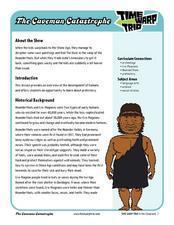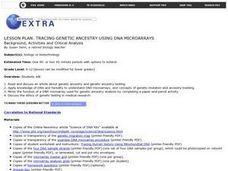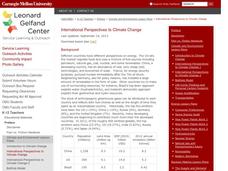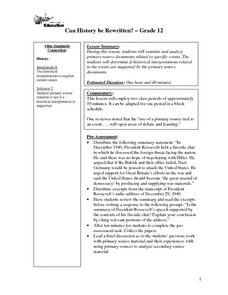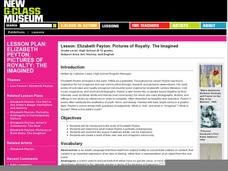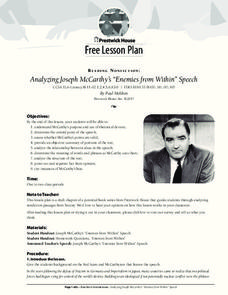Curated OER
World War II: Concentration Camps and Refugees
Students explore the experiences of the people in the concentration camps at liberation during World War II. Students read an article on the Liberation of Belsen Concentration Camp and D-Day and report to the class.
Curated OER
Getting Ready to Write
Young scholars watch an online slideshow that shows Cornelia Funke's transition from an illustrator to a writer. They discuss her writing process from the way she gathers ideas to how and where she writes. Next, they work in groups to...
Curated OER
Did Rome Fall, Or Was It Pushed?
Seventh graders work in teams to research the reasons for the fall of Rome and come to a conclusion of why it did.
Curated OER
Faces of Courage: Teenagers Who Resisted
Students read true stories of teenagers who defied Hitler and avoided participation in the Hitler Youth. They discuss the stories paying attention to the dangers and incredible peer pressure that these children faced. They consider how...
Curated OER
Lessons from the Holocaust
Students investigate the horrors of World War II by participating in a role-playing activity. In this holocaust lesson, students read handouts describing the atrocities committed against the Jews in Germany during the mass slaughter. ...
Boston University
Scramble for Africa
In this fantastic simulation, your young historians take on the roles of imperialistic European countries in the nineteenth century and then "scramble" to carve up the continent of Africa! This is a very hands-on activity that will help...
Community Colleges of Los Angeles
Seeking Refuge: Understanding Refugees in Canada
What if you had no choice but to leave everything behind and seek asylum elsewhere? Do countries have an obligation to accept refugees? To gain an understanding of the complexity of the issues of refugee rights, class members first...
US Holocaust Museum
Remember the Children: Daniel’s Story
Imagine being a child forced from your home and into a concentration camp during World War II. Scholars prepare for a visit to the United States Holocaust Museum by researching the children of the horrible event. They analyze...
US Holocaust Museum
Life in Shadows: Hidden Children and the Holocaust
Hiding in the filth of a sewer, as a child, to avoid capture by Nazi soldiers—sounds scary! Scholars investigate the youngest victims of the Holocaust, the children. They research video clips and written sources from the Holocaust...
Curated OER
Past and Present Trends in Human Migration
In this history worksheet, students will complete a chart about human migration in/from Ireland, Germany, and England in the early 18th century. Students will input information about the natural resources, crops, climate and customs of...
Curated OER
Using Primary Sources to Study the Holocaust
Engage your middle schoolers with Pastor Martin Niemoller's famous poem that begins, "First they came for the communists." Now that you have their attention, send learners to the various work stations you created to have them explore...
Time Warp Trio
The Caveman Catastrophe
Young archaeologists study the development of human history, and work in groups to create a timeline that traces the development of humans. Additionally, the groups utilize a very clever graphic organizer embedded in the plan in order to...
Curated OER
Tracing Genetic Ancestry Using DNA Microarrays
High school learners read and discuss an article about genetic ancestry and genetic ancestry testing. They complete a paper and pencil activity that mimics the function of a DNA microarray and consider the ethics of genetic testing in...
Constitutional Rights Foundation
U.S. Immigration Policy and Hitler’s Holocaust
Though the Statue of Liberty welcomes political refugees to her shores, the welcoming sentiment has not always been reflected in the American citizenry. High schoolers read about the regrettable period in United States history when the...
Carnegie Mellon University
International Perspectives to Climate Change 1
After a lecture about how the first industrial revolution triggered the path to climate change, your environmental studies class discusses what the impacts are. In a culminating activity, they get into groups and identify countries on a...
Lesson Snips
Lessons from the Holocaust
Connect global examples of attempted genocide with a well-designed social studies lesson. It includes an excellent informational text with background information on the Holocaust, as well as worksheets, book report guidelines, and...
Alabama Department of Archives and History
Extra! Extra! Read All About It?
Remember the Lusitania! As part of their study of the causes of World War I, class members examine newspaper articles and propaganda posters about the sinking of the Lusitania and then craft their own news story about the event.
Curated OER
Can History Be Rewritten?
Can history be rewritten? Or, more precisely, is history documented accurately? High school juniors and seniors compare primary source material with secondary sources. For example, they compare President Roosevelt's December 29, 1940...
Curated OER
Lesson: Elizabeth Peyton: Pictures of Royalty: The Imagined
Elizabeth Peyton is an artist who creates images of people (often famous) that she doesn't personally know. These images become part of her imagined community. Learners analyze her work, her community of imagined friends, and then create...
Roy Rosenzweig Center for History and New Media
Slaves and Indentured Servants
In theory, at least, indentured servitude and slavery were two different practices in the American colonies. Class groups conduct a close reading of two primary source documents, one written by a slave and one by an indentured servant,...
Prestwick House
Reading Nonfiction: Analyzing Joseph McCarthy's "Enemies from Within" Speech
Looking for a lesson that teaches class members how to analyze nonfiction? Use Joseph McCarthy's famous "Enemies from Within" speech as a instructional text. Worksheet questions direct readers' attention to the many historical references...
Curated OER
9/11 Essay Questions
After reading about the events of September 11, 2001 learners can think critically with the aid of nine interesting questions. They answer each question in a full sentence and answer as if they were confronted with these questions at the...
Curated OER
Language and Dialect
Practice listening skills while studying oral story tellers from different parts of Louisiana. Consider the regional dialects and insider language of folk groups with your class. Identify language as part of folk life and recognize that...
Alabama Department of Archives and History
Alabama and the Treaty of Versailles
As part of a study of the treaty that ended World War I and the seeds of resentment it planted, class groups compare President Wilson's Fourteen Points and the articles of the Treaty of Versailles.













